What are the Best MBA Programs by Specialty?

Each year, U.S. News and World Report looks at the top business schools around the country to decide which offer the best MBA programs. The goal is to help MBA candidates most effectively choose the best MBA degree to help them achieve their goals based on their interests and strengths. The problem is that there are hundreds of programs and it can be difficult to weed out all the noise to get to the information that you want most.
That’s why the U.S. News and World Report decided to break down all of their findings into a more easily consumable ranking. They outlined the top MBA programs by discipline to help you quickly and easily find the school you’re looking for. Each of the schools on the list was chosen based on alumni interviews, schools statistics, research data, and more.
We’ve broken down the results below along with crucial information about each school listed and where you can learn more information.
The California MBA Program Guide

If you’re looking to earn a California MBA, where should you go to school? Should you choose a top MBA program in Los Angeles or San Francisco? Both cities offer beautiful weather, gorgeous beaches, and world-class business education, but is one location better than the other?
Los Angeles vs. San Francisco
To get started, it’s necessary to compare the cost of living in Los Angeles and San Francisco. According to Numbeo, the world’s largest database containing user contributed data about cities, San Francisco is far and away the more expensive place to live. You would need $7,748.24 in San Francisco, CA to afford the same lifestyle that you can have for $5,700 in Los Angeles. That’s just over $2,000 more per month needed to live in San Francisco, and here’s how that’s broken down.
- Consumer Prices:98 percent higher in San Francisco
- Rent Prices: 51 percent higher in San Francisco
- Restaurant Prices: 62 percent higher in San Francisco
- Groceries Cost: 8 percent higher in San Francisco
- Local Purchasing Power: 77 percent higher in San Francisco
Right off the bat, it’s obvious that the cost of rent (real estate) is what will eat up most of your paycheck in San Francisco, but is that offset by anything? Here are the other things to consider when choosing between San Francisco and Los Angeles.
- Industries
- Los Angeles is ranked top in the country for manufacturing with over 500,000 workers in the industry. Other top industries include banking and finance (more than 100 foreign and domestic banks), entertainment, and tourism.
- San Francisco, on the other hand, is known as Silicon Valley (with San Jose) for its technology companies and startups (Intel, Apple, Genentech, Google, Uber, and Twitter). It’s also a great city for finance, global business, medical science, biotechnology, tourism, and fashion apparel (home of the Levi Strauss & Co headquarters).
- Economic Development: According to the Center for Jobs, San Francisco far and away outperforms Los Angeles in terms of economic growth and development with the Bay Area growing year-over-year while LA has struggled with almost consistent decreases.

- Top Companies: California is home to 53 Fortune 500 companies, second only to NYC. And more of those companies are located in the Bay Area compared to Los Angeles. San Francisco is home to Apple (3), McKesson (5), Chevron (19), and Wells Fargo (25). While Los Angeles is home to Aecom (161), CBRE (214), and Reliance Steel & Aluminum Co (320).
Los Angeles vs San Francisco MBA Programs
The next step is to compare the top three MBA programs in each city. In particular, we wanted to take a look at the tuition rates (two years), GMAT averages, and post-graduation salaries at each program in each city to get a well-rounded picture.
There are a few things to note right away.
- San Francisco is home to more highly ranked MBA programs with two ranking in the top ten on every list. However, it’s important to note that both cities have programs that rank well and are considered top tier schools.
- The average tuition in each city is fairly even. However, the most expensive ($137,00) and the most affordable ($77,000) schools are located in San Francisco, whereas Los Angeles is more even regarding tuition across the board.
- You’ll need a better GMAT score to go to a school in San Francisco, and that GMAT score translates into a higher salary after graduation. San Francisco graduates earn about $11,000 more per year compared to their LA counterparts.
Here’s how it all breaks down per school.
Top 3 Los Angeles MBA Programs
Anderson School of Management – UCLA
The UCLA Anderson School of Management offers a full-time MBA, a part-time MBA, an Executive MBA, and a UCLA-NUS Global MBA (Asia Pacific) program. It’s considered one of the top business schools in the world, ranking 6th in the Economist, 15th in Forbes, 16th in the U.S. News & World Report, and 25th in Financial Times.
- Tuition Rates (two years): $117,176
- GMAT Averages: 719
- Post-Grad Salaries (Mean): $119,964
Marshall School of Business – USC
The Marshall School of Business at USC offers a full-time MBA program, a part-time MBA, an Executive MBA, and IBEAR (International Business Education and Research) MBA, and an Online MBA program. The school’s full-time MBA program is ranked: 20th in the U.S. News & World Report, 33rd in Forbes, 59th in Financial Times, and 65th in the Economist.
- Tuition Rates (two years): $116,361
- GMAT Averages: 703
- Post-Grad Salaries (Mean): $115,309
The Paul Merage School of Business – University of California, Irvine
The Paul Merage School of Business has both a full-time MBA program as well as a part-time fully-employed MBA program. In addition, the school offers an Executive MBA and a Health Care Executive MBA program. The business school is ranked highly across multiple rankings including 41st in Forbes, 42nd in the U.S. News & World Report, 56th in the Economist, 64th in Financial Times.
- Tuition Rates (two years): $87,661
- GMAT Averages: 652
- Post-Grad Salaries (Mean): $97,808
Top 3 San Francisco MBA Programs
Haas School of Business – UC Berkeley
The Haas School of Business offers a full-time MBA, part-time MBA, and Executive MBA program. Haas is ranked as one of the top business school’s in the world ranking in the top ten on every list: 7th overall in U.S. News & World Report and 7th overall in the Economist, as well as 9th overall in Forbes, and 10th overall in the Financial Times.
- Tuition Rates (two years): $117,444
- GMAT Averages: 725
- Post-Grad Salaries (Mean): $125,573
Stanford University Graduate School of Business
The Stanford University Graduate School of Business offers only a full-time MBA program, but it’s one of, if not the top two-year program in the world. When looking at how Stanford GSB stacks up to the competition, the rankings speak for themselves with all in the top ten and most in the top five, including: 1st overall in the Financial Times, 2nd overall in Forbes, 4th in the U.S. News & World Report, and 9th in the Economist.
- Tuition Rates (two years): $137,736
- GMAT Averages: 733
- Post-Grad Salaries (Mean): $144,455
UC Davis Graduate School of Management
At the UC Davis Graduate School of Management, MBA applicants can apply to the full-time MBA or the part-time MBA program. Once again, UC Davis is one of the top schools in the world, ranking 37th in the U.S. News & World Report, 63rd in Forbes, and 67th in the Economist.
- Tuition Rates (two years): $77,698
- GMAT Averages: 669
- Post-Grad Salaries (Mean): $97,695
California MBA Breakdown in Charts
When breaking down the data between MBA programs in Los Angeles and San Francisco, here’s what it looks like
California MBA Tuition (Los Angeles vs. San Francisco)
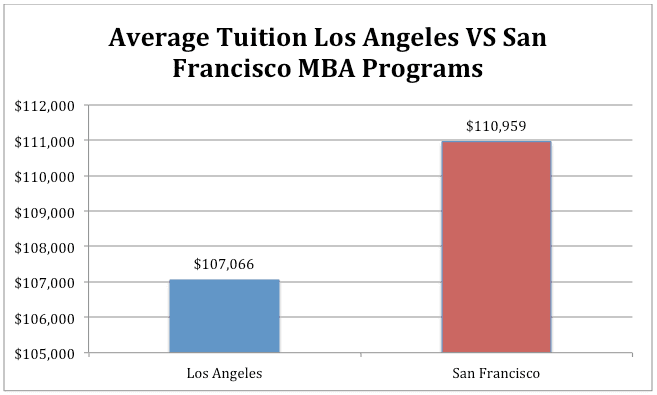
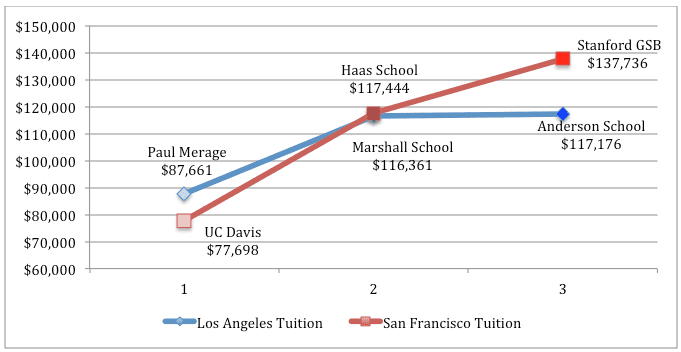
California MBA GMAT Averages
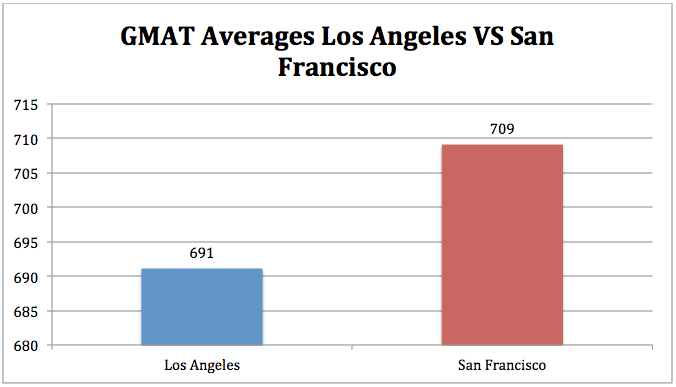
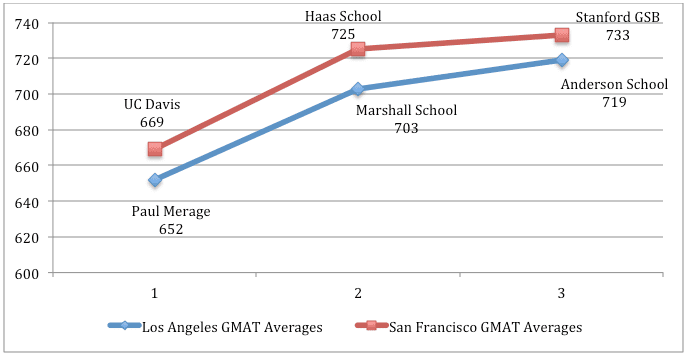
California MBA Post-Graduation Salaries
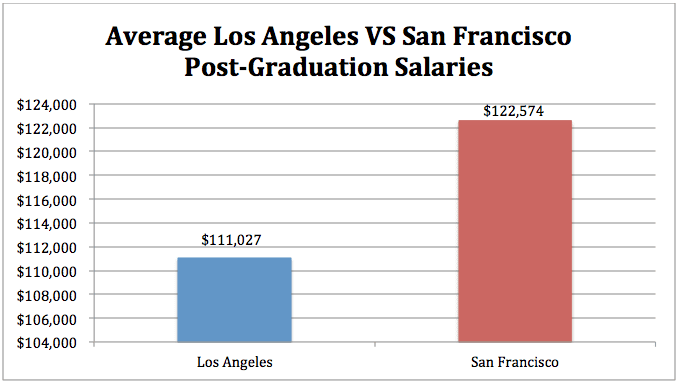
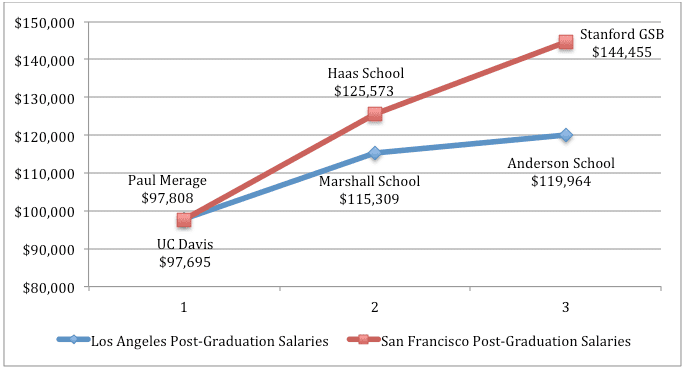
Babson Entrepreneurship Stays at #1 for 25 Consecutive Years
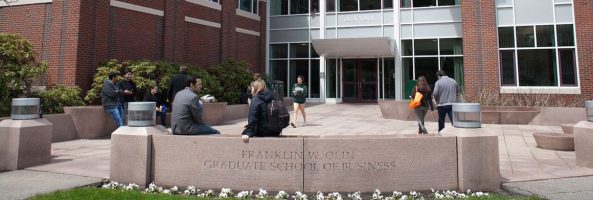
For the 25th year in a row, U.S. News & World Report ranked Babson College’s F.W. Olin Graduate School of Business as the number one program for entrepreneurship in the United States. Entrepreneurship is an indelible part of the business school and MBA program, found within the curriculum, faculty, clubs, centers, and more.
Babson’s Entrepreneurship Curriculum
At Babson, the 50-plus faculty members and 30 adjunct entrepreneurs—the largest dedicated entrepreneurship faculty in the world—come together to teach Entrepreneurial Thought & Action®. This methodology is a way to balance action, experimentation, and creativity with business fundamentals. The goal is to empower students to take action on social, economic, and environmental issues to create value. Students are taught to apply ET&A™ in everything from large corporations to running a charity, solving social issues, and starting a business.
In addition, at Babson, there’s the idea that “we are all entrepreneurs,” which falls under the Entrepreneurship of All Kinds® heading. This concept re-imagines entrepreneurship to include all brilliant improvisers, not just startups, venture capital firms, and business incubators. It looks at how every organization can use entrepreneurship to creatively solve problems and adapt to change.
Both ET&ATM and Entrepreneurship of All Kinds® are interwoven into the very fabric of Babson, being taught in every classroom and every topic.
Babson’s Entrepreneurship Focus
Outside of the curriculum and academic philosophy of Babson, entrepreneurship can be found in dedicated centers and other resources. For example, the school is home to the Arthur M. Blank Center for Entrepreneurship, which helps to accelerate the practice of entrepreneurship through mentoring, competitions, events, workshops, and more. This Center is the hub of the entrepreneurial ecosystem.
There’s also the John E. and Alice L. Butler Launch Pad, which hosts two signature entrepreneurship events every year: the Rocket Pitch and B.E.T.A. Challenge both of which bring together students and alumni to compete in business innovation. The Launch Pad is also responsible for the Summer Venture Program, which accelerates the top 15 student ventures at Babson each year.
To gain more in-depth insight into Babson’s entrepreneurial focus, we had the opportunity to interview Keith Rollag, the Dean-Elect of the Graduate School (starting July 1). He was able to talk to us about how Babson has been able to stay as the number one program for entrepreneurship for 25 years as well as what that looks like at the university.
-
How has the Babson MBA managed to maintain the #1 entrepreneurial slot for so long?
There are several reasons; some of it comes from our first-mover advantage. We taught our first course in entrepreneurship in 1967, and created the Center for Entrepreneurial Studies in the 1970’s at a time when entrepreneurship wasn’t really accepted as a separate business discipline. We started the Babson Entrepreneurship Research Conference in 1981 (which continues to be one of the premier conferences for entrepreneurship) and the Price-Babson Symposium for Entrepreneurship Education in 1984, which over the years has taught almost 5000 educators from over 1000 institutions and 80-plus countries how to teach entrepreneurship.
But our #1 ranking is also due to the creation of a Babson community, culture, and curriculum that is built around entrepreneurship. Entrepreneurship has been an important part of our curriculum since the 1980’s, and we’ve built what we think is the largest entrepreneurship department in the world with over 50 full-time and adjunct faculty members.
Entrepreneurship has been a part of our Babson DNA for decades, and we live it as well as teach it. We are constantly updating our curricula, trying new things, building new partnerships, and exploring new opportunities. The term Entrepreneurial Thought and Action is the latest embodiment of this spirit, and it aptly implies the energy and enthusiasm that is an integral part of Babson.
-
Why do you feel that Entrepreneurial Thought & Action is vital to an MBA education?
At its core, Entrepreneurial Thought and Action is all about rapid learning, and in today’s dynamic world of uncertainty, whoever learns fastest wins. We teach our students to know when to learn quickly through analyzing, strategizing, and planning, and when to learn quickly through prototyping, experimenting, interacting with customers. Both are critical for success, but our education and reward systems tend to favor thinking and discussing over acting. We know from the habits of successful entrepreneurs that in times of high uncertainty, action (and the learning that comes from it) is the best way to solve problems and take advantage of emerging opportunities.
In our Babson MBA programs, we help students develop both a mindset and habit of learning through action. This is valuable whether you are trying to lead innovation within large corporations, grow and expand small and medium-size businesses, create new ventures, or simply find new ways to address complex-but-important problems facing communities, regions, and the world.
Learning quickly is a skill that will always be valued by organizations. While markets, technologies, structures, and roles may change, the need for a manager to learn quickly will never go away.
-
What aspect of your entrepreneurship studies/opportunities/focuses would you like to highlight?
We do many things under the broad heading of “entrepreneurship of all kinds.” Students have the opportunity to participate in intensity tracks around entrepreneurship (where they can build their venture while they are getting an MBA), women-led entrepreneurship, social innovation, and technology development. We also have the Butler Launch Pad as well as our highly competitive Summer Venture Program that helps start dozens of ventures (both business and social-focused). And our MBA students have several clubs focused on regional entrepreneurship and host well-attended conferences on United States, Asian, Indian, and Latin American entrepreneurship.
Whether one is considering starting a company or looking to lead ventures within larger organizations, or just wanting to maximize their impact on the world, an entrepreneurial, can-do, action-oriented mindset primes everyone for success.
Chicago Booth, Michigan Rise in New U.S. News Business School Ranking

The new, official U.S. News & World Report ranking of the best business schools in the United States has been released, with some minor shake-ups at the top. For the second year in a row, Harvard Business School remains tied for the first overall in the ranking. However, the University of Chicago Booth School of Business officially supplanted The Wharton School at the University of Pennsylvania, which fell back from its tie at the top to third overall.
The rest of the top ten, as we previously mentioned, largely resembled last year’s U.S. News release, except for the inclusion of the Ross School of Business at the University of Michigan and the exclusion of the Yale School of Management. Surprisingly, Michigan Ross may have made the strongest showing in the newest ranking, not only managing a position in the top 10, but landing tied for seventh overall—ahead of Columbia Business School and the Dartmouth Tuck School of Business. The Yale School of Management slipped to a tie at 11th overall with Duke University’s Fuqua School of Business.
U.S. News & World Report 2019 Best Business School Rankings
| Rank | School |
|---|---|
| 1st (Tied) | Harvard Business School |
| 1st (Tied) | University of Chicago Booth School of Business |
| 3rd | The Wharton School at the University of Pennsylvania |
| 4th | Stanford GSB |
| 5th | MIT Sloan School of Management |
| 6th | Northwestern University Kellogg School of Management |
| 7th (Tied) | University of Michigan Stephen M. Ross Business School |
| 7th (Tied) | UC Berkeley Haas School of Business |
| 9th | Columbia Business School |
| 10th | Dartmouth College Tuck School of Business |
Chicago Booth, Michigan Shine Among Rising Full-Time MBA Programs
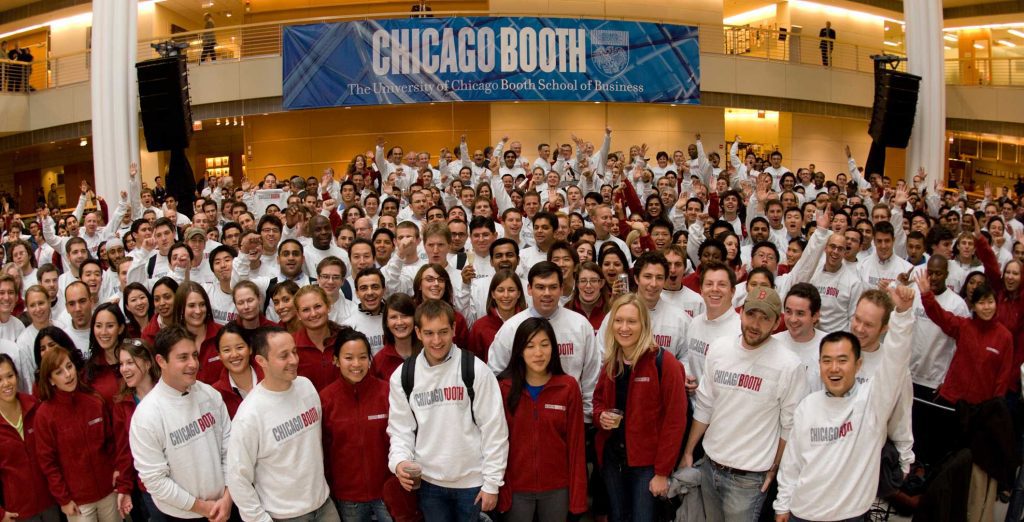
For the first time in school history, the Booth School of Business secured its place atop of the U.S. News ranking (albeit tied with HBS). In a statement, Booth Dean Madhav Rajan noted, “We are pleased to be recognized in this manner, and gratified that the recognition is across the board. We continue to strive to be the pre-eminent academic school of business.”
After its place among the top ten business schools was revealed, Michigan Ross Dean of Business Scott DeRue stated in a release, “We are excited to once again be ranked among the top 10 MBA programs in the country by U.S. News & World Report. This recognition is a testament to the extraordinary talent at Michigan Ross, our innovations in action-based learning, our partnerships with leading companies across the globe, and the most supportive alumni community in the world. We are developing leaders who have the character and capabilities to transform the world through business, and it’s an honor to be recognized among the very best in the world.”
On its website, the school also proudly boasted that, outside of Stanford GSB, no business school in the ranking earned more top ten placements in specialty areas, earning high grades for: “Accounting (No. 4), Entrepreneurship (No. 7), Finance (No. 10), International (No. 5), Management (No. 3), Marketing (No. 4), Non-Profit (No. 5), Productions/Operations (No. 3), and Supply Chain (No. 6).”
Outside of the top ten, the USC Marshall School of Business watched its stock rise again this year. Two years ago, U.S. News handed USC Marshall the 31st spot on its best business school ranking, which jumped to 24th last year, and 20th this year. Just a few spots back of USC was the Jones Graduate School of Business at Rice University, which saw the largest leap of any of the top 25 schools—jumping six spots from the previous year.
Nine schools among the top 100 in the new rankings managed to jump at least ten spots, including three MetroMBA favorites: the Whitman School of Management at Syracuse University, the Neeley School of Business at TCU, and the Fordham School of Business at Fordham University. Whitman, in fact, tied for second highest rise, improving 18 spots overall from last year’s 88th overall placement to 70th this year. No school improved more, however, than the Weatherhead School of Management at Case Western Reserve University in Cleveland, Ohio, which improved a remarkable 22 spots from last year’s 77th overall placement to 55th this year.
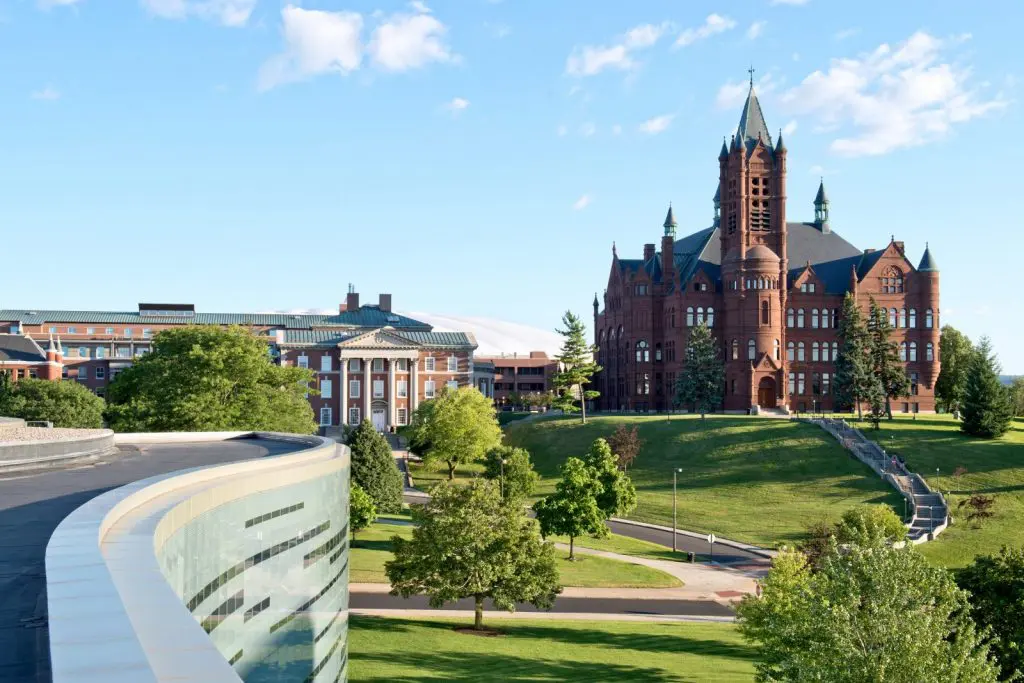
The Syracuse University Whitman School of Management jumped 18 spots in the most recent U.S. News “Best Business Schools” ranking.
A handful of schools also secured a spot in the top 100 after not appearing at all the previous year, including the Howard University School of Business, the American University Kogod School of Business, and Argyros School of Business and Economics at Chapman University.
Which Schools Fell The Hardest?
Along with the Yale School of Management losing its prestigious top ten status, a handful of schools tumbled in the 2019 ranking—with some virtually flat-lining. No school fell more than the Poole College of Management at North Carolina State University, slipping an astounding 35 spots from 55th last year to 92nd this year. Eleven schools lost their top 100 status in total. The reasoning behind the sudden drops are likely linked to the publication’s change in how it ranks the business schools.
In regards to the ranking methodology, U.S. News placed less value in test scores and student GPA. In a release this afternoon, U.S. News reported the following:
“For the first time U.S. News reduced the value of reported GPA, GRE and GMAT scores for full-time and part-time MBA programs and GRE scores in the education rankings if less than 50 percent of an entering class submitted these scores. U.S. News believes this lack of data means the scores are not representative of the entire class.”
The change, arguably, could stem from the fallout of the Temple University Fox School of Business, which was knocked off all of the publication’s rankings for the 2018 calendar year because of falsely reported data regarding test scores.
Stay tuned to MetroMBA on all the biggest MBA ranking news.
U.S. News Reveals Sneak Peek of Its 2019 Business School Rankings

With just over a week before U.S. News & World Report reveals its eagerly-anticipated 2019 best business school rankings, the publication offered a sneak peek of the business schools that managed to earn spots within the top 10.
Unsurprisingly, the top 10 of the 2019 rankings resembles the publication’s 2018 edition, with nine out of the top 10 schools nearing the top of the annual list. The lone ranking variation from 2018 to 2019 will be the University of Michigan Stephen M. Ross School of Business, which came in 11th in the previous year.
The top ten business schools for the 2019 U.S. News rankings are as follows (unordered):
- The Wharton School at the University of Pennsylvania
- Harvard Business School
- The Booth School of Business at the University of Chicago
- The Kellogg School of Management at Northwestern University
- The Ross School of Business at the University of Michigan
- The Tuck School of Business at Dartmouth University
- The Sloan School of Management at MIT
- The Stanford Graduate School of Business
- University of California—Berkeley (Haas)
The one school left out of the newest rankings from the previous edition was the Yale School of Management.
The publication will release the full list of the 2019 best business school rankings will officially arrive on March 20, 2018. Stay tuned for more updates on the rankings on MetroMBA.
MBA on the Lake: Higher Learning in Chicago & Toronto

To have some type of natural source to balance out the cacophony of city life is crucial to a healthy mind. Not every major city is a concrete jungle, completely broken off from its former natural self or its surroundings. It might surprise city slickers the amount of wilderness opportunities that exist just outside their doorstep.
Take Toronto, for instance. Situated on the shoulder of Lake Ontario, Toronto is surrounded by plateaus, deep forest, ravines, and three rivers. While other Canadian cities may beg to differ, Toronto is the financial and cultural capital of the country. It has long been a hub for migration since the days of the Huron and Iroquois and houses the five largest financial institutions in Canada.
As the heart of American transportation and distribution, Chicago’s metropolitan reputation belies its abundance of natural splendors. Located at the toe of Lake Michigan, the Second City plays host to a wide array of green spaces—arboretums, nature centers, conservatories, and botanical gardens—as well as lakeside walking and biking paths.
Both Chicago and Toronto are world centers for higher education and research, yet offer resplendent surroundings to maintain a balanced state of mind. Both offer much more affordable living situations than New York or San Francisco and are highly underrated for their cultural appeal. Whichever you choose, you will find established, reliable education in your pursuit for the proper MBA. Last month, we analyzed the best part-time offerings in both metros, but let’s take a closer look at the full-time MBA options.
Our Favorite Toronto Full-Time MBA Programs
York University – Schulich School of Business
The Schulich School of Business at York University offers 18 MBA specializations. In addition to full-time programs, the school also accommodate working students with part-time programs that offer both day and evening courses. Students are also able to switch between full and part-time status during their tenure to suit their needs. In 2016, 89 percent of students were hired within three months of graduation by 140 companies. Graduates were employed with an average salary of $91,860 USD and an average signing bonus of $12,050.
McMaster University – DeGroote School of Business
DeGroote School of Business at McMaster University offers full-time and part-time options, as well as a three-year paid work term co-op schedule. Full-time applicants are required to have one year of full-time continuous managerial, professional, or technical work experience (this is where the Co-op plan can come in handy—work as you go). The school offers seven specializations and International study. About 94 percent of recent graduates were employed within six months (over the last two years) with an average starting salary of $71,930 USD.
Western University Canada – Ivey Business School
The Western University Canada Ivey Business School is technically located just outside of Toronto, in London, Ontario. The school offers a full-time program that gives students an opportunity to work with over 200 recruiters, with about 66 percent of graduates finding jobs in Canada. In 2017, 91 percent of the graduating class received a job offer by September 1. Average starting salaries were typically around $90,000 USD with an average signing bonus of $15,000. Other compensations averaged at $9,875.
CHECK THIS OUT: Kings of the North: Should You Get a Part-Time MBA in Chicago or Toronto?
University of Toronto – Rotman School of Management
Students in the Rotman School of Management full-time MBA program are offered 16 major options and more than 90 electives to allow for a very customizable experience. Between 2016 and 2017, 85 percent of full-time Rotman MBA students were employed within six months of graduation and 80 percent landed jobs just within three months. Average starting salaries were $85,000 USD with an average signing bonus of $13,500.
Ryerson University – Ted Rogers School of Management
MBA applicants at the Ted Rogers School of Management at Ryerson University are given two full-time options: the Global MBA or an MBA in the Management of Technology and Innovation (MBA-MTI). Their Global MBA program strives to help their graduates “understand the global context of various industries and have the knowledge necessary to drive innovation and deliver as capable and confident leaders.” The MBA-MTI helps students “gain the skills needed to manage within companies that are focused on tech and innovation.” Last year, about 80.3 percent of graduates found employment within three months of graduation and earned an average starting salary of $89,250 USD.
Our Favorite Chicago Full-Time MBA Programs
Booth School of Business – University of Chicago
The University of Chicago Booth School of Business offers what the school calls the “world’s most flexible MBA program,” and is regarded by U.S. News & World Report as the third best full-time offering in the U.S. The curriculum consists of 20 classes—nine mandatory and 11 courses tailored to personal interest—plus a Leadership Effectiveness and Development (LEAD) program. As of September 2017, an absurd 97.1 percent of graduates reported having received full-time job offers within three months, with 95.3 percent accepted offers in that time. Average starting salaries were an impressive $125,000 with an average starting bonus of $25,000.
Kellogg School of Management – Northwestern University
The Kellogg School of Management at Northwestern University offers two full-time MBA variations, either to be completed in one or two years. The school’s 2017 employment report, which can be downloaded here, detailed that 94.1 percent of graduates received job offers within three months and 90.8 percent of those grads accepted job offers. The average starting salaries for graduates with three-to-five years of work experience was an unsurprisingly lavish $128,686.
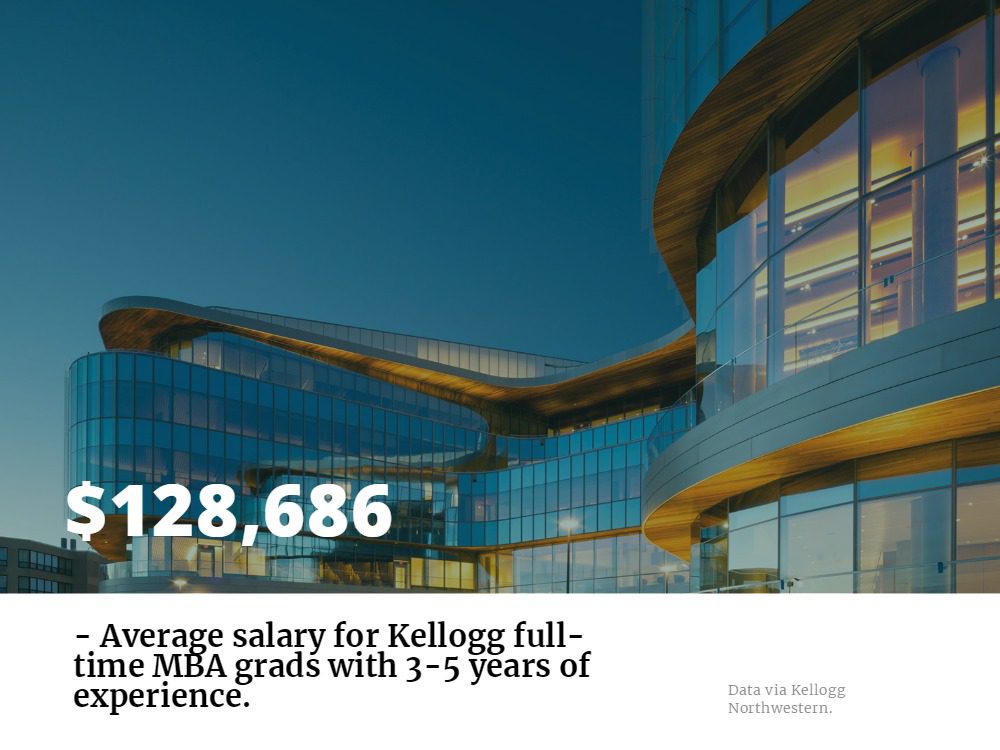
Like the Booth School of Business, when comparing Chicago and Toronto programs, financial gain is clearly an advantage for those who elect to study in the U.S. However, perhaps unsurprisingly, schools like Kellogg come with a steeper tuition cost. Applicants for the One Year full-time program should expect to pay more than $133,000 for the entire program, while those in the Rotman School of Management will have to pay around $75,000 USD.
Kellstadt Graduate School of Business – DePaul University
At the DePaul University Kellstadt Graduate School of Business, students can obtain a full-time MBA with the availability of 100 courses in 20 MBA concentrations and 17 specialized Master degrees. In 2016, within six months 89 percent of surveyed graduates were employed, 14 percent being entrepreneurial, contract or freelance. Average starting salaries were about $82,200.
Liautaud Graduate School of Business – University of Illinois at Chicago
The Liautaud Graduate School of Business at the University of Illinois at Chicago full-time MBA is a 13.5 course program, with six courses designed to deepened functional business knowledge, while the remaining 7.5 are geared towards allowing students to customize their experience towards their personal career interests. They provide twelve concentrations in their MBA program.
Mendoza College of Business – Notre Dame
The Mendoza College of Business at Notre Dame University offers two traditional full-time MBA options, which can be taken in two years, or just one in a more accelerated format. According to employment statistics recently released by the business school, about 88 percent of Two-Year full-time students were given a job offer within three months of graduating, with about 86 percent of those graduates accepting the offers. Like many of the major business schools located in the Chicago metro (although, yes, Notre Dame is technically in Indiana), full-time MBA grads enjoyed a lush base salary upon employment, with an average salary of $105,000 for the Class of 2017. Median signing bonuses also ranked in the higher end of the schools on this list, coming in at around $20,000.
The Mendoza College of Business is one of the many business schools in the U.S. that has seen a dramatic shift in terms of graduates moving into the tech industry. Three industries in particular dominated when it came to employing Mendoza MBA grads: tech, financial services, and consulting. However, a slim majority (24.7 percent) joined the tech industry, enjoying salaries slightly higher than the Mendoza average, coming in at $110,000.
Quinlan School of Business – Loyola University
The Quinlan School of Business offers full-time MBA offering is one of the most affordable high-quality Chicago options out there, with the most recent full-cost of the program coming in at $73,422; comparable to many of the aforementioned Toronto programs. And unlike many of the programs on this list, Quinlan isn’t located in some quaint suburb. Rather, the school is centered right on the historic Magnificent Mile in Chicago, fully integrated into the vibrant city.
